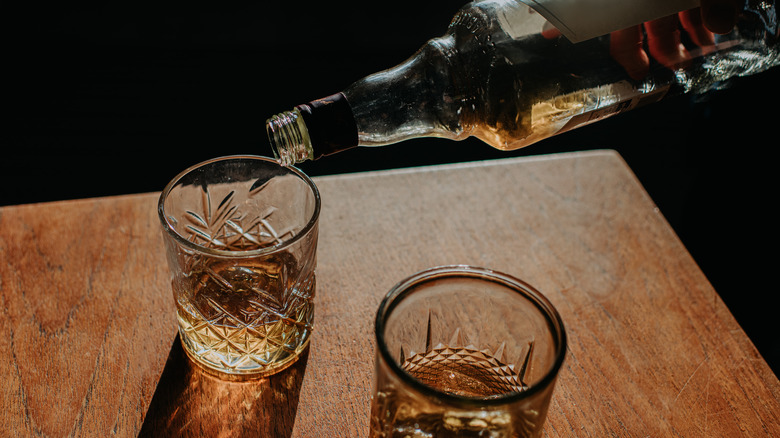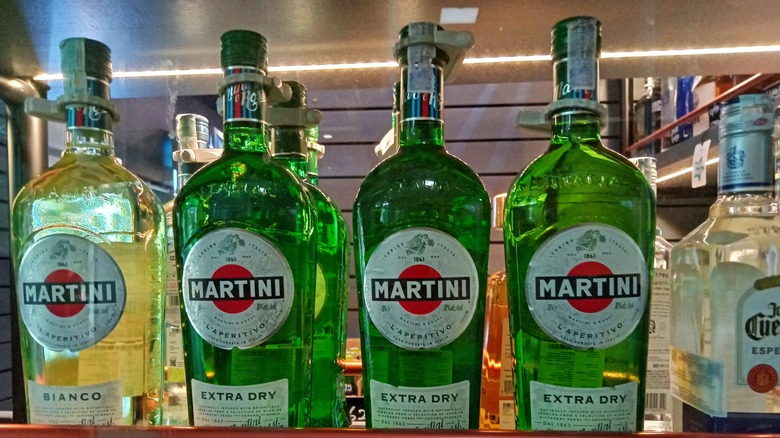Does Alcohol Ever Actually Go Bad?
Nothing kills the appetite quite like spoiled food or beverage. We've all had that moment with a stale milk carton, or a batch of fruits developing mold. Yet when it comes to alcohol, the determination of stale becomes a lot trickier. Sure, we've all sniffed a wine that's gone a little rancid, or taken a sip of a beer that's gone flat. Yet what about all the other boozy types — like liquors, amari, sake, meads, vermouths, and more?
Well, turns out the answer's complicated, and depends not only on the general category, but the specific substyle. As a general rule of thumb, consider whether your booze in question has been fermented or distilled. If it's exclusively produced by natural fermentation (like a cider or mead in addition to beer and wine) then it is possible for it to spoil. Under concentrations of approximately 20% ABV, bacteria can sprout in the alcohol, completely souring the drink. The more dominant fermented material in the bottle, the shorter the shelf stability; why unpasteurized sake will only taste good for a few weeks after opening.
Meanwhile, once distillation is employed, the alcoholic environment is no longer hospitable to foreign growth. As a result, spirits don't spoil, so they're technically safe to drink indefinitely. Nevertheless, exposure to oxygen after opening does alter their chemical composition, which effectively deteriorates the flavor over time. And drinks in the liqueur and fortified wine territory are especially delicate, due to their complex composition.
Liquors store indefinitely, but lose flavor
As long as you keep unopened liquor bottles in a cool and dark location, they'll last indefinitely. Just make sure to keep them properly sealed, and don't let the booze touch the cork — the storage mistake that spoils your whiskey. Exposure to oxygen troubles spirits in a twofold manner: causing alcohol to evaporate and inciting oxidative reactions that impact the flavor. So after a couple years, the bottle's chemical composition heavily transforms. Just how quickly — and dramatically — the spirit changes depends on the style.
The most stable of spirits is vodka, which comes as no surprise due to its booze-forward flavor. Especially since storing cheap vodka in the freezer is a savvy move, there's not much to worry about with this liquor. Just a notch below are more flavorful unaged spirits like rum, gin, mezcal, tequila, shochu, moonshine, and the like. These contain more compounds that contribute to the taste, meaning the mingling of oxygen greatly alters the flavor profile. Nevertheless, they'll still be tasty for a year or two.
Further down the stability totem pole are barrel-aged liquors. Firstly, even a sealed liquor might turn cloudy, due to the reaction of leaked air and fatty acids in the bottle. After opening, delicate barrel-aged spirits like a nice whiskey and rum will start to lose their pop as soon as six months in. The flavors will turn dull, and the intricate nuance dissipates. So if you've shelled out for a top shelf aged tequila like an añejo or Scotch, don't waste your time enjoying it.
Vermouths and liqueurs are more delicate alcohols
The more components that go into a bottle, the more complicated the stability. So when it comes to liqueurs — which come sweetened — you'll need to approach spoilage on a case by case basis. On one hand, dense concentrations of sugar act as a stabilizer, warding off unwanted foreign components. On the other, sugar can crystallize or turn undesirably syrupy. Not to mention the sweetener often comes with further components, which all lessen the strength of the bottle.
There's also added complexity depending on the flavors. Bitter and bracing liqueurs like Fernet Branca and Campari offer a strong dose of flavor that'll last on the bar cart for many years. On the opposite end of the spectrum is cream liqueur; due to its inclusion of dairy, there'll even be a best-by date on the bottle, typically six months out. Thankfully, though an Irish cream liqueur can be used in many delicious ways — so no need to fret this one. The rest of liqueurs fall into a variable range, but for optimal flavor, try to use within a year of opening before flavors go bad.
And finally, there's perhaps the most finicky booze style on the bar cart: vermouth and other fortified wines. Since this type of alcohol is made with a wine base, it does degrade, completely losing its flavor within eight weeks. For this reason, it should always be refrigerated after opening, and especially drier vermouths should be enjoyed quickly.


